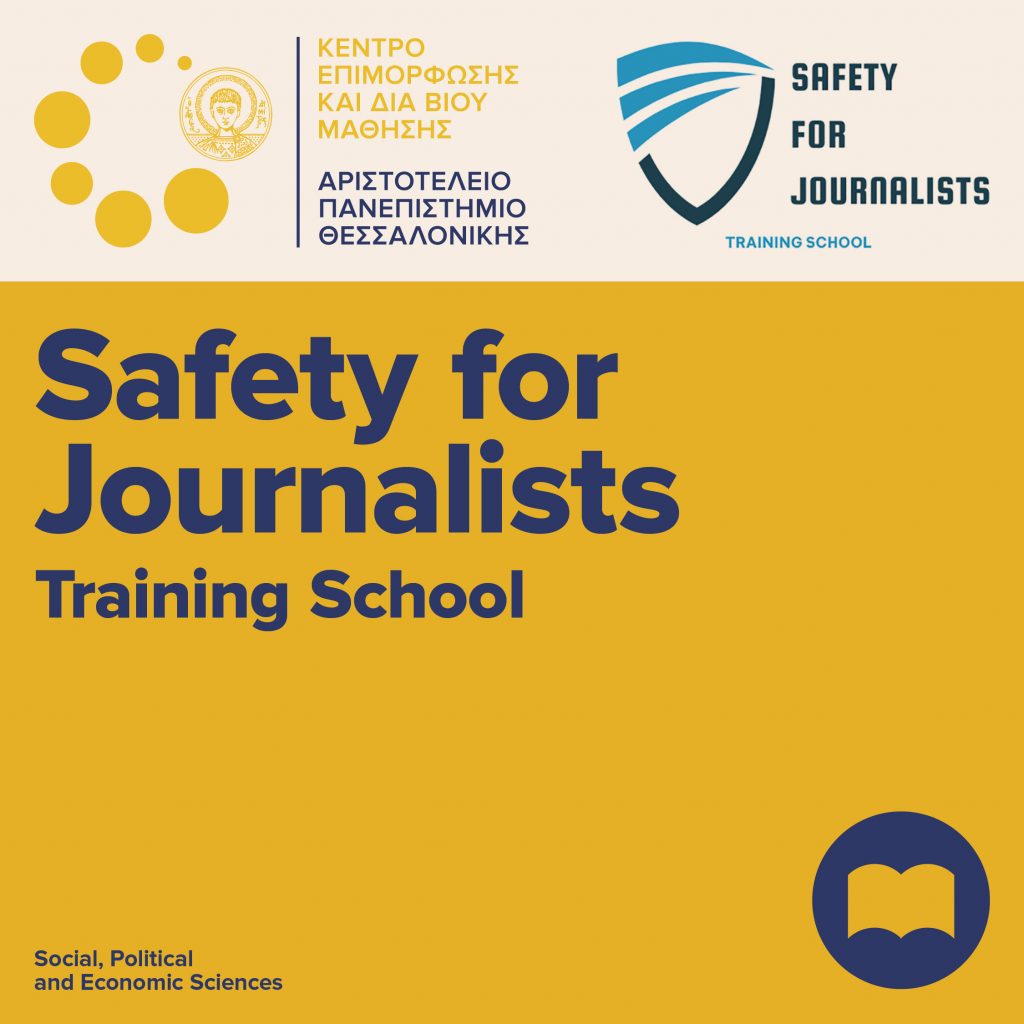2022-08-29 - 2022-09-01 ( )
Physical Presence
Based on discount policy
Form Submission is completed on
Form Submission is completed on

The Center for Education and Lifelong Learning of the Aristotle University of Thessaloniki welcomes you to the “Safety for Journalists”, a 29-hour course via physical presence.
The Director of the Programme is Nikolaos Panagiotou, Associate Professor at School of Journalism & Mass Communications of Aristotle University of Thessaloniki.
Application
Candidates submit the application form online.
Each application has to be accompanied by the following document or copies:
The program aims to train and prepare those that intent covering events in war zones. In particular, its purpose is to train the participants for the preparation they should do before their departure, to equip them with the necessary knowledge to cope with the difficulties they have to face while they are in the field and finally, to inform them about issues, such as post-traumatic stress, which will need to be managed upon their return. The program will provide participants with theoretical and practical training.
Upon completion of the course, participants will be trained on the following:
The program is addressed to professionals in the field of mass media and to students of corresponding departments who are called to cover war situations in news.
Selection will be due to scoring.
Order of priority will be followed.
The curriculum includes two main parts, theoretical and practical field training.
For the development of the training program, in addition to the specialized experience of those involved, research was conducted in order to record both the needs and concerns of young people who would be interested in working as war correspondents, as well as the experiences of war correspondents, so that the result focuses and responds to the real needs of the learners.
Course Description
| Title & Description of Teaching/Thematic Unit Subsection Title & Description |
Hours | Tutor | Reporting war and crisis |
| Reporting war and crisis aims to introduce to the students the main aspects of war reporting, ranging from physical difficulties war reporters face in the ground, up to develop understanding of different biases and the impact of their own reporting. | 4 | Nikolaos Panagiotou | Peace Journalism |
| Peace Journalism is defined “when editors and reporters make choices – of what to report, and how to report it – that create opportunities for society at large to consider and value non-violent responses to conflict” (Lynch and McGoldrick, 2005). Under this framework, the students will be introduced to peace journalism principles and develop an understanding of the impact of their reporting. | 4 | Christos Fragonikolopoulos | Hybrid war |
| Contemporary conflicts are characterized by the use of mass media, social media and networks as well as any other mean of communication in pursue of effects in favor of the conflicting parties. Students will learn the basics of hybrid warfare in the field of media communications. | 5 | Christos Smilianis | New ways of producing and communicating reports |
| In nowadays media ecology, reporters have unpresented capabilities of reporting and sharing their content. Time is crucial, as well as impactful reporting. In this part, students will be introduced in new ways of producing and communicating reports in an time effective and impactful ways. | 8 | Ilias Nikezis | Verification of the news |
| Disinformation is an issue that we face in our every day life, but when it comes to war and conflicts it consists one of the main means of the parties involved. News come from the field through numerous different means, and although we have unlimited information, it comes in poor quality. The verification of news constitutes a crucial capacity in contemporary war and crisis. | 8 | Spyridoula Markou | – |
Upon successful completion of the course, participants will be awarded a Certificate of Completion.
For the successful completion of the program, the participants should:
Participants, who have attended but not completed successfully, will be awarded a Certificate of Attendance.
For further information, please contact ipjllab@gmail.com
Tuition fees cost will be 500€.
Discount:
The payment will be done in one instalment in Bank account.
Developed by: AUTH IT CENTER